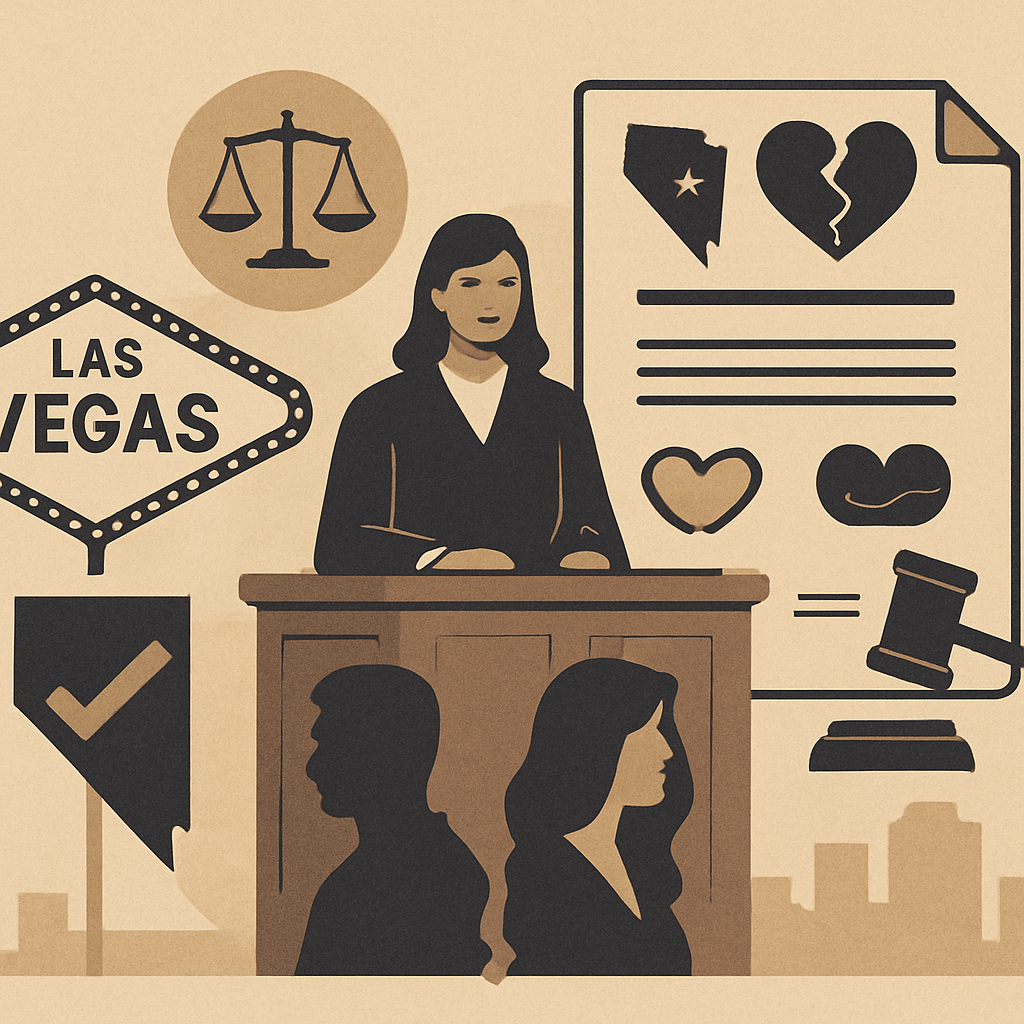
Divorce in Las Vegas Attorney Guide: Why You Need an Attorney
If you’re considering getting a Divorce in Las Vegas Attorney Guide, it’s important to understand the legal requirements and the process to ensure that your rights are protected throughout the proceedings. Nevada is a no-fault divorce state, meaning that you don’t need to prove any wrongdoing to get a divorce. However, navigating the legal process and handling critical decisions about property, custody, and support can be overwhelming. That’s why it’s essential to seek an experienced family law attorney to guide you through each step.
1. Establish Nevada Residency
To file for divorce in Nevada, at least one spouse must have lived in the state for six continuous weeks before initiating the process.
- Proof of Residency: Residency can be established with a signed affidavit from a Nevada resident or through other documentation (e.g., utility bills, lease agreements).
Why You Need an Attorney: While proving residency may seem simple, your attorney can help ensure that all documentation is properly submitted to avoid delays in your divorce filing. A skilled attorney will make sure that your case meets all jurisdictional requirements.
For more details about residency, visit Nevada’s Official Website on Residency Requirements for Divorce.
2. File the Divorce Papers
Once residency is established, the next step is to file the appropriate divorce forms, such as the Complaint for Divorce or a Joint Petition for Divorce if both parties agree.
- You can file the forms:
- In Person
- By Mail
- Electronically through Nevada’s e-filing system.
Why You Need an Attorney: Filing for divorce involves more than just filling out forms. The paperwork can be complex, especially when it comes to property division, child custody, and support. An attorney will help you fill out these forms accurately, ensuring that all necessary details are included and preventing any costly errors.
Filing Fees: Filing fees vary by county. If you are unable to afford the fees, an attorney can help you explore options for fee waivers.
Divorce in Las Vegas Attorney Guide: 3. Serve Your Spouse
After filing the divorce papers, you must have a neutral third party serve the documents to your spouse.
- Timeframe for Response: Your spouse has 21 days to respond to the Complaint for Divorce.
Why You Need an Attorney: Ensuring proper service of documents is crucial. An attorney will help coordinate this step and make sure your spouse is properly notified to avoid delays or complications in the process.
For more information on serving divorce papers, refer to Nevada Divorce Paper Service.
4. Negotiate or Litigate
In a uncontested divorce, both parties agree on the terms, such as asset division and custody arrangements. This is usually a quicker and less expensive option.
However, in a contested divorce, when you and your spouse can’t agree on the terms, mediation or litigation may be necessary.
Why You Need an Attorney: Divorce negotiations can be challenging, especially when it comes to child custody or property division. A divorce attorney can represent your interests during negotiations or court hearings, ensuring that you get a fair settlement.
If you choose to pursue mediation, your attorney will help ensure that your rights are protected and that any agreement made is in your best interest.
Consider speaking with an attorney about mediation for divorce as an alternative to litigation.
Divorce in Las Vegas Attorney Guide: 5. Obtain a Final Decree
Once all terms have been agreed upon or decided by the judge, you will obtain a Decree of Divorce.
- Uncontested Divorce: The judge will review your agreement and issue a final decree.
- Contested Divorce: The judge will make decisions on unresolved issues after reviewing evidence and hearing testimony.
Why You Need an Attorney: The final decree is an important legal document that can impact your future. An attorney will ensure that the decree accurately reflects the terms of your divorce and is legally binding. They will also guide you through any post-divorce modifications, such as child support or custody changes.
Nevada is a community property state, meaning that assets acquired during the marriage are generally divided equally. If you and your spouse cannot agree on how to divide property, your attorney can help you negotiate or represent you in court.
For more on community property, visit Nevada Community Property Law.
Divorce in Las Vegas Attorney Guide: Additional Considerations:
- Divorce Timeline: An uncontested divorce can be completed in as little as two to three weeks, but contested divorces may take several months to finalize.
- Collaborative Divorce: If you want to avoid litigation, a collaborative divorce may be an option. This allows both parties to work together to resolve issues with the help of professionals, without the need for a lengthy court battle.
Why You Need an Attorney Throughout the Process:
While a divorce may seem straightforward, it involves complex legal issues that require a deep understanding of Nevada law. A skilled family law attorney will:
- Help you understand your legal rights and obligations.
- Ensure that the paperwork is completed correctly and filed on time.
- Represent your interests in negotiations and court hearings.
- Provide guidance in making important decisions regarding custody, support, and asset division.
Don’t face the challenges of divorce alone—consult with an experienced divorce attorney to help you navigate this difficult time.




